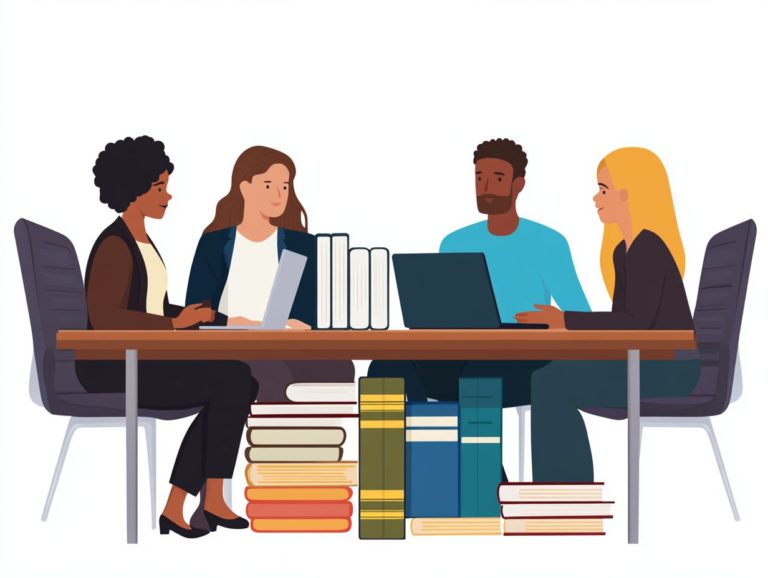5 Tips for Navigating Your Rights
Understanding your rights is essential in today’s landscape, whether you’re dealing with legal matters, facing workplace challenges, or simply striving to advocate for yourself. This article presents five vital tips that will empower you to navigate your rights with confidence.
From grasping your fundamental rights to seeking legal advice and keeping important records, you’ll find valuable guidance on effectively advocating for yourself. Explore with us as we delve into the most prevalent legal issues individuals encounter and uncover strategies to overcome the obstacles in standing up for your rights.
Contents
- Key Takeaways:
- 1. Know Your Basic Rights
- 2. Understand the Legal System
- 3. Seek Legal Advice
- 4. Document Everything
- 5. Don’t Be Afraid to Speak Up
- What Are Your Rights as a Citizen?
- Frequently Asked Questions
- What are some common rights that people may need to navigate?
- Why is it important to know your rights?
- How can I educate myself about my rights?
- What should I do if I feel like my rights have been violated?
- How can I effectively assert my rights?
- Do my rights differ depending on my gender, race, or other factors?
Key Takeaways:

Know your basic rights as a citizen and at work. Understand the legal system, seek help when needed, and document everything.
1. Know Your Basic Rights
Understanding your fundamental legal rights is essential for navigating the legal system in both personal and professional disputes. This knowledge gives you the power to make informed decisions while protecting you from potential misconduct.
Recognizing and asserting your rights can significantly enhance your emotional well-being. It alleviates feelings of vulnerability and confusion in challenging situations. When you are equipped with a clear understanding of your rights, you can confidently confront unfair treatment at work or deceptive practices in the marketplace.
These rights act as a safeguard against discrimination and exploitation, fostering a healthier workplace culture and more equitable trading environments. To advocate effectively, it s crucial to:
- Maintain records of any incidents,
- Familiarize yourself with the complaint processes,
- Seek assistance from legal resources or support groups when needed.
Empowering yourself with knowledge drives personal growth and promotes justice. Start today!
2. Understand the Legal System
Understanding the legal system is essential for anyone facing legal battles. It gives you the power to navigate the intricate legal processes and make informed choices about your representation.
This knowledge clarifies the importance of keeping good records and understanding key timelines. When you understand these elements, you can approach your situation with increased confidence, leading to more effective strategies for addressing your disputes.
Grasping how legal processes function allows you to ask the right questions and seek the appropriate resources. Advocating for your interests is a crucial step toward achieving favorable outcomes. Developing this understanding lays a solid foundation for tackling legal challenges head-on.
3. Seek Legal Advice
Seeking legal advice from a qualified defense attorney or utilizing legal aid services is crucial when faced with legal disputes. Doing so equips you with the knowledge and resources necessary to build an effective strategy.
This proactive approach ensures you won t have to navigate the complex legal landscape alone. It helps you sidestep potential pitfalls that could jeopardize your case. By choosing to consult with experienced professionals, you gain valuable insights into the intricacies of the law and understand your rights.
Accessing legal aid can be a lifeline if you re facing financial strain. It provides you with competent representation. Ultimately, prioritizing professional guidance can lead to more favorable outcomes, as you ll be better prepared to present your case and advocate for your interests.
Take charge of your rights now! Equip yourself with knowledge and resources to stand strong.
4. Document Everything

Keeping detailed records is essential! Are you doing this? Proper documentation aids in preserving evidence and significantly influences the outcome of legal proceedings, ensuring your case is well-organized.
This includes contracts, correspondence, receipts, and photographs each a crucial piece of the puzzle. Accurate records help you grasp events clearly and protect your legal rights against potential claims or disputes.
You must maintain a consistent system for organizing and updating these documents. Leverage digital tools to streamline the process, offering easy access and reliable backups.
Promptly document conversations and decisions to strengthen your position and provide compelling support if the situation escalates.
5. Don’t Be Afraid to Speak Up
Advocating for yourself and confidently discussing your legal rights is essential in navigating disputes. Learning how to effectively assert your rights can pave the way for better outcomes and provide the emotional support you need during challenging times.
When you voice your concerns and needs, you empower yourself and foster a more collaborative atmosphere with your legal representatives. This proactive stance can help alleviate feelings of isolation and anxiety. Sharing your perspective invites understanding and validation!
Prepare questions in advance, practice active listening, and use clear, assertive language to elevate your ability to engage in meaningful dialogue.
Recognizing the emotional benefits of speaking out from heightened confidence to reduced stress motivates you to stand up for your rights.
What Are Your Rights as a Citizen?
As a citizen, understanding your legal rights is essential for safeguarding yourself against injustices. Familiarize yourself with rights such as the Miranda rights your rights to remain silent and have an attorney during police questioning as these protect you during encounters with law enforcement.
These rights empower you in both personal and professional realms. Take the right to free speech, for example. It s vital not just for voicing your opinions but also for nurturing a culture of transparency in the workplace.
Grasping the right to privacy enables you to navigate challenges related to data protection and employer surveillance, highlighting the significance of consent in various interactions.
Knowing how to assert these rights through legal avenues or advocacy groups provides reassurance. Ultimately, being an informed citizen equips you to advocate for your rights and contribute to a just society.
How Can You Protect Your Rights in the Workplace?
Protecting your employment rights is essential for securing fair treatment and shielding yourself against corporate disputes and misconduct that could impact your professional trajectory.
Understand your individual rights related to wages, discrimination, and workplace safety. Familiarizing yourself with federal and state laws governing labor practices empowers you with knowledge about the specific protections available to you.
To safeguard your rights, take proactive steps such as:
- Document incidents meticulously.
- Record all communications with management.
- Attend workplace training sessions regularly.
In serious situations involving violations or harassment, seek legal representation for invaluable guidance and support. This enables you to navigate the complexities of employment law effectively while advocating for your rights with confidence.
What Are the Most Common Legal Issues Faced by Individuals?

You may face various legal challenges. These include traffic violations, consumer protection complaints, and employment rights disputes. Such situations can become complex, requiring skilled navigation through the legal system.
These disputes can weigh heavily on your daily life, leading to considerable stress and potential financial strain. They can also damage your personal reputation. It s common to feel uncertain about your rights, and this lack of awareness can complicate resolution even further.
However, taking proactive steps can greatly reduce the impact of these challenges. Understanding relevant laws and seeking timely legal advice is crucial. By tackling issues early on, you can steer clear of lengthy legal battles. Don’t let misunderstandings lead to loss of income or legal penalties.
This approach paves the way for a more secure and informed future.
How Can You Advocate for Your Rights in a Legal Setting?
Advocating for your rights in a legal setting requires a solid grasp of legal frameworks and effective communication. It s essential that your legal representation reflects your best interests.
This journey calls for a varied approach that blends legal knowledge with strong communication skills. When preparing for meetings with legal professionals, clearly articulate your needs and objectives.
Practicing clear narratives can set the stage for constructive dialogue. This allows you to express your concerns effectively. Before these interactions, gather relevant documents and formulate specific questions.
This preparation shows your readiness and demonstrates respect for the professionals’ time. Keep in mind that your voice is a powerful tool in advocating for your rights.
What Are the Most Important Documents to Keep for Legal Purposes?
Maintaining essential documents such as governing documents, contracts, and correspondence is critical for preserving evidence in legal proceedings. Preparing ensures you’re ready for potential disputes.
These key documents are the backbone of your legal claims and defenses. They also facilitate clear communication among all parties involved. From leases and agreements to compliance correspondence, these records provide necessary context when conflicts arise.
To safeguard these vital records, organize them into categorized files both physically and digitally. Use labeled folders for easy access and secure cloud storage for protection. Regularly updating and reviewing these documents enhances your ability to respond efficiently to any legal issues.
How Can You Overcome Fear and Speak Up for Your Rights?
Overcoming the fear of speaking up for your rights calls for emotional support, effective communication strategies, and a solid grasp of how to prepare for your rights discussion.
Creating a safe environment where you feel valued can enhance your willingness to articulate your thoughts. Engaging in preparatory practices, like role-playing conversations, can boost your confidence and ease anxiety.
Simple techniques such as deep breathing or positive affirmations before speaking can help manage nervousness. Additionally, seeking feedback from trusted peers after practice sessions can refine your skills.
By building a robust support network and honing communication techniques specifically for legal situations, you can become a more assertive advocate for yourself.
Frequently Asked Questions

Some common rights that people may need to navigate include workers’ rights, consumer rights, healthcare rights, housing rights, and civil rights.
Why is it important to know your rights?
It is important to know your rights because they protect you from discrimination, exploitation, and injustice. Knowing your rights helps you make informed decisions and advocate for yourself.
How can I educate myself about my rights?
You can educate yourself about your rights in several ways. Try reading laws, attending workshops, and seeking advice from legal professionals.
What should I do if I feel like my rights have been violated?
If you believe your rights have been violated, gather evidence and document what happened. It’s crucial to seek legal advice.
How can I effectively assert my rights?
To assert your rights effectively, stay calm and confident. It’s important to know your rights and consider how to stay informed about your rights so you can communicate clearly.
Do my rights differ depending on my gender, race, or other factors?
Yes, your rights can vary based on your gender, race, nationality, or age. Be aware of specific laws that may apply to you.






